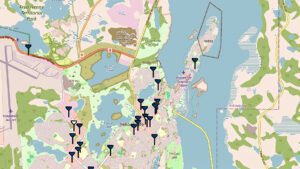In an effort to deal with an increase of drug use and sales in public housing across the NWT, the RCMP has started to share information with local housing organizations to help expedite rental office hearings.
 Criminality in public housing units has long been a sore spot with Regular MLAs, who have complained to a succession of Housing Ministers to do something to make life peaceful for law-abiding tenants.
Criminality in public housing units has long been a sore spot with Regular MLAs, who have complained to a succession of Housing Ministers to do something to make life peaceful for law-abiding tenants.
In the Assembly on Friday, Housing Minister Lucy Kuptana said in the 2023-2024 fiscal year, the Rental Officer issued 63 Eviction Orders to public housing tenants, with 18 of those evicted.
Of those evictions, three were evicted under the Residential Tenancies Act for illegal activities, and 13 of the evictions were due to disturbances.
So far in this fiscal year, there have been seven evictions from public housing — two of those evictions were due to illegal activity, and three were due to disturbances.
Kuptana represents the riding of Nunakput in the Beaufort Delta and said the Inuvik Housing Authority has been successful in obtaining expedited rental office hearings, due to illegal activity in public housing units.

A new Housing NWT modular fourplex in Paulatuk was completed this fall for single people, providing more affordable housing options in the community. (Photo courtesy Housing NWT)
“Housing NWT does not evict tenants on a whim,” said the Minister. “Evictions are the last action in a long process seeking to address non-compliance with a tenancy agreement.
“Illegal activity can be hard for local housing organizations to prove, but they often go hand-in-hand with repeated disturbances, which could lead to eviction.
“Proving illegal activity can be challenging. Witnesses may be too frightened to formally complain for fear of retaliation.”
Kuptana called on Members of the Legislative Assembly and residents to report illegal activity in public housing so that local housing organizations can address the issues and help keep residents safe.
Meanwhile, Tu Nedhé-Wiilideh MLA Richard Edjericon repeated his call for a fix to the spotty cellular service in Ndilǫ.
He questioned Finance Minister Caroline Wawzonek about if officials can soon work with the Yellowknives Dene First Nation to come up with an emergency backup plan for residents in Ndilǫ in the event they have to call for help in an emergency.
“It’s really important that we need to address this issue, because this issue has been ongoing for a very long time, and I just want to just leave that there,” asked Edjericon.
Tu Nedhé-Wiilideh MLA Richard Edjericon in the assembly Friday. (Image courtesy of Assembly livestream)
Wawzonek said collaboratively exploring financing options for improved cell service is “absolutely” something that can happen.
And Jay Macdonald, who is Minister of Environment and Climate Change, said a major agreement was ratified this week which will help fund Indigenous-led conservation initiatives
The re-named Our Land for the Future Agreement provides participating Indigenous governments and Indigenous organizations with the funding engage in activities “we agree to do together in our shared conservation work plan, Healthy Land, Healthy People,” said the Minister.
The initiative includes 23 Indigenous governments, the GNWT, the federal government, and three private donors.
One problem area this agreement will solve is to provide long-term financial support the management of protected areas such as Thaidene Nëné National Park Reserve, while creating jobs in nearby
The federal government previously announced $300 million to support the then-named NWT Project Finance for Permanence Agreement, enhanced by an additional $75 million coming from private donors.
The agreement this week includes a strategic plan and financial plan, which outline how the funds will be used and ensure proper oversight and accountability
The Assembly has now risen for the Fall session, returning on February 5th. There will be four full weeks of committee work in the interim.

Cell towers in Yellowknife, with Ndilǫ shown at top in box. The lack of a nearby tower leaves residents of the Dene community without reliable cell phone service. (Image courtesy of Ertyu.org)





